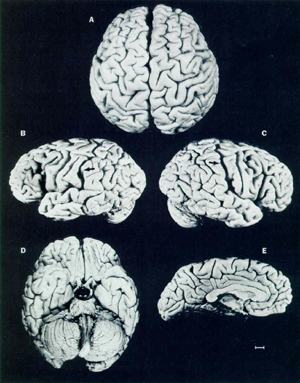Thomas Jefferson asserted that African-Americans were mentally inferior to whites, a sentiment that still pervades in white supremist circles. Former Harvard University President, Lawrence H. Summers, suggested that one of the reasons there are fewer women in science and engineering fields might be because of innate differences between women and men. News articles covering studies that show a reproductive gap between educated women, who are less likely to have children, and low-income families, which have more children, show a concern over shifting demographics affecting societal welfare. This concern is unfortunately expressed, as one editorial put it, as the “Number of Stupid People on Earth is Increasing.”
All of these opinions result from our society considering intelligence something biologically predetermined, a trait linked to race, sex, income, or something else in our genes, inherited from our parents, and we look for evidence to support this hypothesis. In the past, scientists tried to correlate skull measurements with intelligence. In recent decades scientists have puzzled over Einstein’s brain, trying to measure what makes it different from average brains.
 Photographs of Albert Einstein’s brain Credit: Witelson, Sandra F; Kigar, Debra L; Harvey, Thomas |
The theory that natural selection favors species with the ability to learn is known as the “Baldwin Effect,” named after the American psychologist James Mark Baldwin who proposed it. Animals with instinctual or “programmed” behaviors have the advantage of being able to survive at birth. Humans are born without the innate ability to survive, crippling our survival chances in infancy. We humans must learn to work within our environments, which gives us the potential to grow into whatever environment we are born to.
The success of our evolutionary strategy of intelligence is evidenced in the fact that humans live everywhere on the planet and even outside of it on the International Space Station. Through agricultural, medical, and other sciences we have engineered the world to support 6.5 6.6 billion of us. We succeed as a species because our big brains are equipped to learn. This organ carries a very heavy cost, consuming 20 percent of our daily energy to function despite accounting for only two-percent of our adult body weights; therefore, the advantages the brain confers on our survival must be that much greater than its costs to maintain it.
Neuroscience has made great strides in understanding the architecture of the “three pound universe” we carry around in our craniums and which in turn cradles our consciousnesses. The traditional consensus was that humans do not regenerate brain cells, but scientists have observed cell regeneration in the Hippocampus, the part of the brain involved in learning and memory. Mice that exercised were found to have 2.5 times as many nerve cells in this region as those who did not. Mental exercises have been shown to combat the effects of senility in seniors.
In Einstein’s brain, the portion linked to mathematical and spatial thinking was 15 percent larger than average; however, this does not necessarily mean he was born more intelligent. It just as likely that this part of his brain grew larger in response to his exercising it with complex problems. Rats with enriched environments developed more glial cells for each neuron compared with rats in deprived environments. Einstein’s brain shows a higher than average glial cell to neuron ratio in his brain also.
All of these findings indicate a plasticity in human intelligence and learning, growing or languishing depending on our environment and how much we challenge ourselves mentally. The average human IQ is growing at a rate of 3 points each decade, a phenomena known as the “Flynn Effect,” which forces standardized test to set the bar a little higher every so often. We are collectively growing smarter as a species, and we are doing so on purpose, not because of heredity.
Brains work like muscles, growing stronger when we exercise and nourish them. As another study has shown, when we teach our children this fact that they can proactively improve their intelligence, they do better in school. Not only is intelligence dynamic, but a self-fulfilling prophesy as well.
Comments
5 responses to “Intelligence is Dynamic”